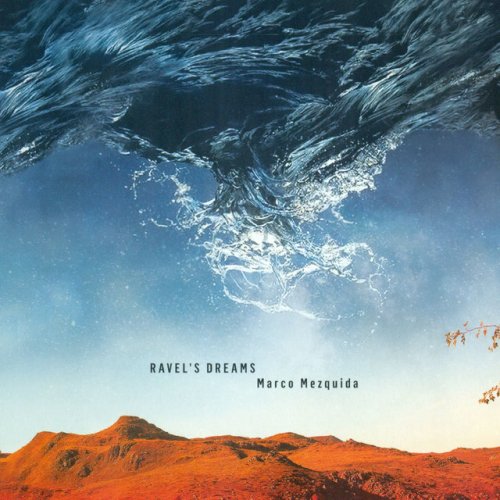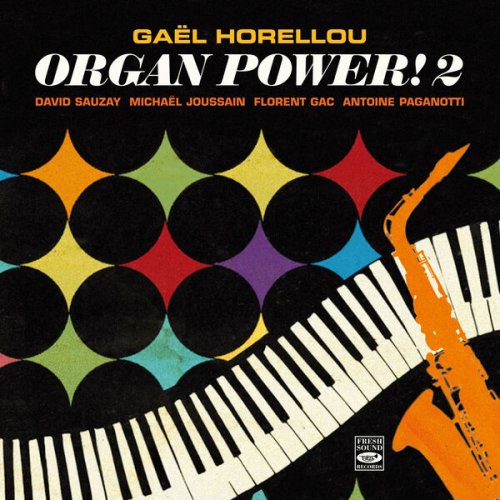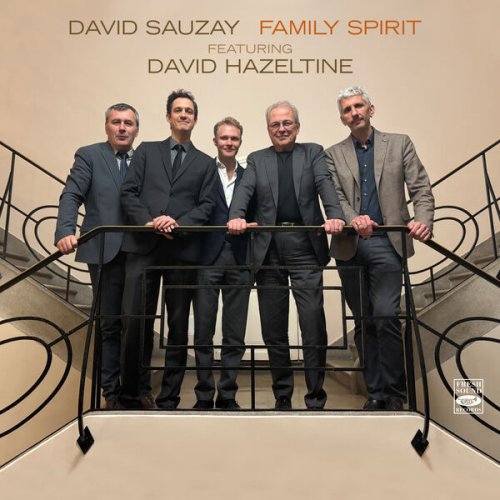Seiji Ozawa - Berlioz: La Damnation de Faust (1990)
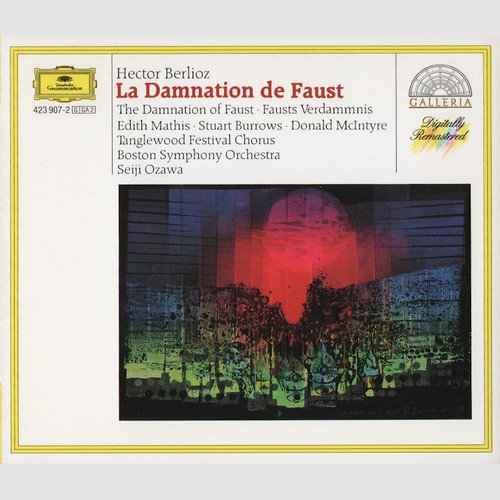
Artist: Seiji Ozawa
Title: Berlioz: La Damnation de Faust
Year Of Release: 1990
Label: Deutsche Grammophon
Genre: Classical
Quality: FLAC (image+.cue,log,scans)
Total Time: 02:01:45
Total Size: 640 mb
WebSite: Album Preview
Tracklist: Title: Berlioz: La Damnation de Faust
Year Of Release: 1990
Label: Deutsche Grammophon
Genre: Classical
Quality: FLAC (image+.cue,log,scans)
Total Time: 02:01:45
Total Size: 640 mb
WebSite: Album Preview
Hector Berlioz (1803-1869)
CD 1:
01. La Damnation de Faust- Part 1. Scene 1. Introduction. Le vieil hiver a fait place au printemps [0:05:34.25]
02. La Damnation de Faust- Part 1. Scene 2. Ronde des Paysans. Les bergers quittent leurs troupeaux [0:04:11.27]
03. La Damnation de Faust- Part 1. Scene 3. Mais d'un éclat guerrier les campagnes se parent. Marche Hongroise [0:04:29.05]
04. La Damnation de Faust- Part 2. Scene 4. Sans regrets j'ai quitté les riantes campagnes [0:04:02.68]
05. La Damnation de Faust- Part 2. Scene 4. Chant de la Fête de Pâques. Christ vient de ressusciter! [0:06:28.67]
06. La Damnation de Faust- Part 2. Scene 5. Ô pure émotion! Enfant du saint parvis! [0:02:14.23]
07. La Damnation de Faust- Scene 6. Choeur des Buveurs [0:02:46.17]
08. La Damnation de Faust- Scene 6. Chanson de Brander [0:02:13.40]
09. La Damnation de Faust- Scene 6. Fugue sur le Thème de la Chanson de Brander [0:02:59.30]
10. La Damnation de Faust- Scene 6. Chanson de Méphistophèlès [0:03:41.10]
11. La Damnation de Faust- Scene 7. Air de Méphistophèlès [0:02:38.23]
12. La Damnation de Faust- Scene 7. Choeur des Gnomes et De Sylphes [0:06:05.72]
13. La Damnation de Faust- Scene 7. Ballet de Sylphes [0:03:21.68]
14. La Damnation de Faust- Scene 8. Finale. Choeur de Soldats. Chanson d'Etudiants [0:04:32.55]
CD 2:
01. La Damnation de Faust- Third Part. Tambours et trompettes sonnant la retraite [0:01:09.35]
02. La Damnation de Faust- Scene 9. Air de Faust. Scene 10 [0:05:30.57]
03. La Damnation de Faust- Scene 11. Que l'air est étouffant! [0:02:57.50]
04. La Damnation de Faust- Scene 11. Le Roi de Thulé [0:04:28.20]
05. La Damnation de Faust- Scene 12. Evocation [0:01:50.33]
06. La Damnation de Faust- Scene 12. Menuet des Feux Follets [0:06:04.40]
07. La Damnation de Faust- Scene 12. Sérénade de Méphistophèlès [0:02:19.12]
08. La Damnation de Faust- Scene 13. Duo [0:05:09.58]
09. La Damnation de Faust- Scene 14. Trio et Chœur. Allons, il est trop tard! [0:05:07.72]
10. La Damnation de Faust- Part 4. Scene 15. Romance. D'amour l'ardente flamme [0:08:36.35]
11. La Damnation de Faust- Part 4. Scene 15. Au son des trompettes [0:02:13.03]
12. La Damnation de Faust- Part 4. Scene 16. Invocation à la Nature. Nature immense, impénétrable et fière [0:04:02.05]
13. La Damnation de Faust- Part 4. Scene 17. Récitatif et Chasse. A la voûte azurée [0:03:33.00]
14. La Damnation de Faust- Part 4. Scene 18. La Course à l'Abîme. Dans mon cœur retentit sa voix [0:03:30.67]
15. La Damnation de Faust- Part 4. Scene 19. Pandaemonioum. Has! Irimirukarabrao! Has! - Epilogue sur la Terre. Alors, l'Enfer [0:05:01.38]
16. La Damnation de Faust- Part 4. Scene 20. Dans le Ciel. Laus! Hosanna! - Apothéose de Marguerite. Remonte au ciel, âme naïv [0:04:50.00]
Performers:
Faust - Stuart Burrows
Méphistophélès - Donald McIntyre
Marguerite - Edith Mathis
Brander - Thomas Paul
Tanglewood Festival Choir
Boston Boys' Choir
Boston Symphony Orchestra
Seiji Ozawa – conductor
This recording makes a fine companion to Ozawa's "Roméo et Juliette" (see my review) which enjoys the great advantages of the Boston Symphony Orchestra and the Tanglewood Chorus in their prime: beautiful orchestral playing and singing of verve and distinction. Some find Ozawa's direction a little under-stated and remark that, as if to compensate, he indulges in rather obvious accelerandos, as in the Marche Hongroise - but I think Berlioz of all composers can take an overtly agogic approach and for me Ozawa's interpretation is so seductive on the ear. Munch is more propulsive, but Ozawa brings out the sheer depth and richness of Berlioz's layered writing for a very big orchestra. Another great advantage is the plaintive tenor of Stuart Burrows also in his prime - occasionally his vibrato becomes a little broad and he croons one or two top notes, but he has such a lovely tone and a sensitive understanding of the role. His French is good if not flawless and he has enough steel to balance the velvet.
Donald MacIntyre is not in smoothest voice; there is a fair amount of bluster and he tends to bully rather than cajole his victim into submission - for a really suave demon, listen to José van Dam for Solti - but his characterisation is all of a piece. I understand why some complain that he does not "sound French" compared with artists such as Munch's Singher, but have also read objections to Edith Mathis "sounding too German". I am not sure what that means but she has a very vibrant, bright sound which is somewhat disconcerting to anyone habituated to a mezzo such as Janet Baker or Frederica Von Stade as Marguerite. Leaving that aside, she sings with feeling and full, fluting (soprano) tone, in excellent French.
The sound is a liitle muddy but this recording is already getting on for forty years old and is perfectly acceptable. It takes its place alongside other favourite versions by Munch and Markevitch in that it has the most virtuosic orchestral playing and a very appealing Faust.
Donald MacIntyre is not in smoothest voice; there is a fair amount of bluster and he tends to bully rather than cajole his victim into submission - for a really suave demon, listen to José van Dam for Solti - but his characterisation is all of a piece. I understand why some complain that he does not "sound French" compared with artists such as Munch's Singher, but have also read objections to Edith Mathis "sounding too German". I am not sure what that means but she has a very vibrant, bright sound which is somewhat disconcerting to anyone habituated to a mezzo such as Janet Baker or Frederica Von Stade as Marguerite. Leaving that aside, she sings with feeling and full, fluting (soprano) tone, in excellent French.
The sound is a liitle muddy but this recording is already getting on for forty years old and is perfectly acceptable. It takes its place alongside other favourite versions by Munch and Markevitch in that it has the most virtuosic orchestral playing and a very appealing Faust.
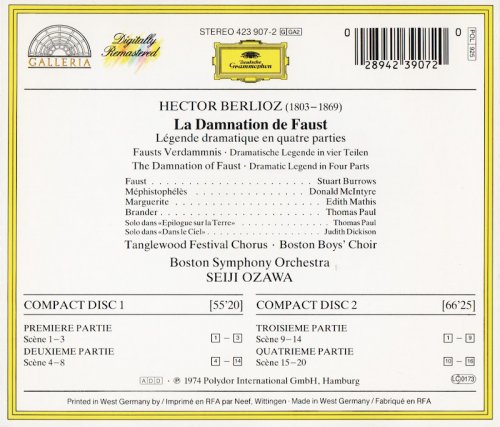


![Matt Choboter - And Then There Were The Sounds Of Birds (2026) [Hi-Res] Matt Choboter - And Then There Were The Sounds Of Birds (2026) [Hi-Res]](https://www.dibpic.com/uploads/posts/2026-02/1771562657_qb70awhgfhge8_600.jpg)
![Tom Oren - Dark Lights (2026) [Hi-Res] Tom Oren - Dark Lights (2026) [Hi-Res]](https://www.dibpic.com/uploads/posts/2026-02/1771427884_tdqtmzk78zgcb_600.jpg)
